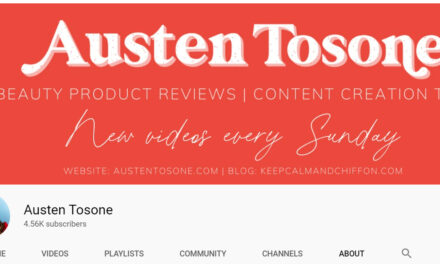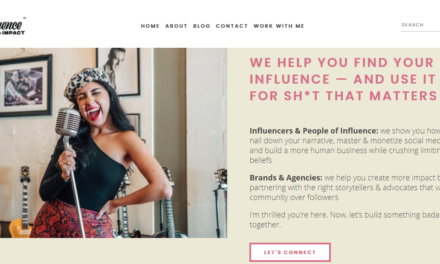
APRIL 30, 2021
full tilt
Survey Says Original Research Is a Valuable Tool for Content Entrepreneurs
What’s the news?
Every day, you likely see a headline in your feeds with phrases like, “Survey Finds …,” “Research Shows …,” or “Poll Indicates …” You also likely see multiple polls and surveys populating your social media feeds every day.
So what?
People are interested in what other people think and do. They also are interested in knowing what different data means for them on a business or personal level.
Why does that matter to a content entrepreneur?
Publishing original research presents an opportunity for your content business. Done right, it can bring instant credibility and increased awareness of your brand.
The Tilt Talk and Advice
How does research help a content business?
You want to be seen as a go-to expert resource on your subject matter. Yet, that can be difficult when you’re a team of one (or even a few). When you have original research – and share it with the wider world – they likely will focus on the results, not how big the business is.
Other benefits?
Speaking opportunities, media interviews, backlinks (an SEO booster), fodder for your own content, and subscriber base growth. It could eventually become a revenue stream.
Does it have to be original research?
Yes. You should create something proprietary to your brand.
What are the options for original research?
You can execute primary or secondary research. Primary research is based on data you (or your agents) collect. Secondary research is based on data from other sources (like the U.S. Census or a Pew Research poll).
Isn’t research costly?
It can be, but it doesn’t have to be. If you want to go deep, your starting cost would probably be at least $20,000. But you also can start small and do it yourself (after learning all about the subject) or work with a consultant who specializes in small businesses, low budgets.
What are less costly research options?
Here are a couple of options: a quantitative survey with a narrow focus or an aggregated study using publicly available data. You also can do the legwork and seek partners with large audience databases.
Where should you start?
Look to see what research already exists around your topics and themes. Identify what might be missing. Narrow your options and ask your audience which they would like to know more about.
What else?
The Tilt believes strongly in this advice. We’re in the midst of a survey of content entrepreneurs. If you haven’t completed it, please complete it here. (And we’ll share the results later this year.)
– Ann Gynn
To learn more about how original research can help your content business and how to execute it, read the longer story.
Brainy Thought Leader Creates Successful Content Business
Entrepreneur: Charlotte Labee
Biz: Charlotte Labee
Tilt: Balancing brain for a fitter, more energetic, healthier life
Channel: Instagram Followers: 68.2K
Time to Revenue: 1.5 years
Time to Profitability: 4.5 years
Rev Streams: Books, online courses, supplements, members-only platform
Our Favorite Actionable Advice
- Put your passion first: Charlotte didn’t start to create a content business. Her goal was – and still is – to share information to help people.
- Be authentic: Don’t just listen to your audience, share with them your own stories, warts and all.
- Don’t stay single: As your business grows, you may need to hire people to help and/or to partner with others who can help you achieve a bigger vision.
Some of the Story:
With the right side of her body paralyzed, Charlotte Labee got a clear message from her doctor: “If you continue to live your life like that for just another two to three months, you will end up in a wheelchair forever.”
But it wasn’t easy. Her brain wasn’t wired that way. She researched the brain and she researched it some more, striving to understand how it works, how food consumption affects energy levels, and more.
Charlotte wanted to take what she learned to the masses. She began posting on Instagram and started speaking at live and virtual events. She would spend up to six hours a day posting and engaging. In three years, she had 50K followers.
“Building status was more important than the number of followers. I have had a clear mission and vision from the beginning, and I love what I do, so that made the job a lot easier,” Charlotte says.
Today, her Instagram followers total over 68K. While she has a presence on all the major social platforms, she focuses most of her attention on Instagram as well as LinkedIn, where she has about 13K followers. She’s written two bestselling books on the brain and recently launched a joint-partner membership site.
– Joe Pulizzi
All the Story: To learn more about Charlotte Labee, the content entrepreneur and business, check out the longer story.
Know a content creator who’s going full tilt? DM us or email ann@thetilt.com.
quick talk
Caught on … Twitter
things to know
Money
-
Spot on dollars: Spotify announced it plans to let podcasters who use its Anchor tool to select episodes as subscriber-only content. Unlike Apple’s new service, Spotify won’t take a cut for two years (and in 2023, plans to have a 5% access fee). (TechCrunch)
Our take: It’s an attractive option for podcasters who want to use the popular streaming service as a distribution channel but don’t want to give away a cut of their subscriptions for the privilege (like Apple is). -
Boost for books: In the pandemic era, book sales jumped 8% and moved with increasing frequency to online transactions. That’s good news for self-published authors, many of whom saw their sales increase, who have a greater chance at success online. (Jane Friedman)
Our take: If you’ve planned to add a book to your content business, now is the time if you have an audience. A book is a great way to diversify once you’ve built your base platform.
Audiences
-
New York Times, who?: When Mark Zuckerberg sat down for a rare in-depth interview, he chose journalist Casey Newton who has a newsletter (Platformer) on Substack, instead of a big traditional media outlet. (Slate)
Our take: It’s a great indicator that a content creator’s reputation (and audience) increasingly matters more than wide distribution. That shift is a game-changer for content entrepreneurs who want their calls and emails returned from high-profile subjects. -
Think people, not wallets: “Consumers no longer own ‘things’ as status symbols; they attach status to social belonging, experiences, lifestyles, and purpose-driven movements.” (The Marketing Insider)
Our take: Think about your audience as people, not potential buyers. That view will lead to more authentic content and interactions to which your audience will respond more enthusiastically.
Tech and Tools
-
Clubhouse meets creator coins: Only holders of Jeremiah Owang’s creator coin ($JOW) can enter his gated room on Clubhouse. He says it’s a first for the Rally cryptocurrency platform. (Jeremiah Owang)
Our take: Creator coins present many possibilities for content entrepreneurs to create their own economies. Jeremiah’s move demonstrates how gated content, not just a Clubhouse room, can be opened by the coins. -
Warning tweets: You may have an easier option if Twitter posts a warning label on your tweet. Jane Manchun Wong shows the option appears when she clicks on a tweet’s options (i.e., embed, pin this post). (tl;dr Marketing)
Our take: First, pause and ask why the warning label was placed. If your tweet is factually correct and not misleading, Twitter may not be the only one who is misreading your tweet. You can appeal or maybe you should just delete.
And Finally
-
Marketing expense sold: Eighteen months ago, Jay Acunzo launched his 3 Clips podcast, this week he sold it to Castos. “I considered the project a loss leader, a marketing expense, and of course, a labor of love,” Jay says. He also thought he needed a big audience to sell; he didn’t. He needed the right audience. (3 Clips)
Our take: When you create content to market your content business, make it great. You never know when it can become an unintended but welcome business opportunity. (Oh, and check out Jay’s podcast where he explains the acquisition from soup to nuts, including how they structured the deal.) -
Minor dent for Twitch: Former Twitcher James ‘Phantoml0rd’ Varga says he won a five-year legal battle against the platform for banning him for life and was awarded $20,720. Twitch says he’s still banned from the platform. (gameindustrybiz)
Our take: Phantoml0rd may have won the legal battle, but Twitch reminds us all that they still control who can be on the platform.
we’re a stan for Dakota Krout
A self-published author, Dakota Krout wrote his first LitRPG (literary role-playing game) fantasy fiction book in 2016 as a hobby. He published and sold it through Amazon. He tells Insider he didn’t even hire a copy editor or cover designer to help him.
A review on social changed his trajectory. The reviewer posted to the 10K-member Facebook Group LitRPG Books. He didn’t know about the group, but he joined as soon as they tagged him. A month later, book sales totaled $5,000, according to his Insider interview.
As Dakota tells Insider, he then immersed himself in learning about writing and starting a business while interacting at events with the larger community. He’s now written dozens of books in the bestselling Divine Dungeon and Completionist Chronicles series. He’s been a top 10 bestseller on Audible and a top 15 best seller on Amazon.
Along the way, he also launched a Patreon subscription service, and he and his wife, Danielle, founded the publishing company Mountaindale Press.
In 2020, Insider reports the now 30-year-old earned over $1.8M.
Why we’re a Stan: When opportunity unexpectedly knocked in the form of a social media review, Dakota enthusiastically opened the door to become a content entrepreneur. He recognized that writing a book as a hobby wasn’t going to get him far in business. Dakota charted his own content entrepreneurial education path. And while he’s had tremendous success, he’s never taken his eye off the core product – his literary role-playing game fantasy fiction – that drew his audience in the first place. (Oh, and he did bring in the pros to redesign his original covers.)
the business of content
As content entrepreneurs, we can’t fall into the trap of playing the same game as larger businesses. Hear what Joe Pulizzi, founder of The Tilt, has to say about avoiding this mistake in his weekly podcast, Content Inc. (It’s worth the six minutes.)
In the latest This Old Marketing, Joe and Robert Rose discuss if the biggest part of a paid advertising budget is with influencers now. Hint: The boys think not.
flex your tilt
We’re launching this feature soon. But we need your help. Let us know who to feature (self-nominations are encouraged). Use #TheTilt. DM us. Or email Ann@TheTilt.com.
the tilt team
Your team for this issue: Joe Pulizzi, Ann Gynn, Laura Kozak, Dave Anthony, and Mackenzie Pippin.
Get more of the Full Tilt stories on TheTilt.com.
Know a content creator who’s going full tilt? DM us. Old school? Email ann@thetilt.com
Was this email forwarded to you? Get your own sub here.
Copyright ©2021 Tilt Media LLC All rights reserved.
Unsubscribe | Update your profile | 17040 Amber Drive, Cleveland, OH 44111





